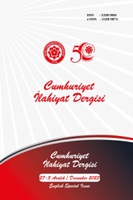Determination of the Establishment, Development and Activity Areas of the French Institute of Oriental Studies:Inalco
Determination of the Establishment, Development and Activity Areas of the French Institute of Oriental Studies:Inalco
Author(s): Hakan Temir, İsmail MetinSubject(s): Higher Education , Sociology of Culture, History of Islam, Sociology of Education, Sociology of Religion, History of Religion
Published by: Cumhuriyet Üniversitesi İlahyat Fakültesi
Keywords: İslamic History; France; Oriental Studies; Inalco; Language Education;
Summary/Abstract: Language is a fundamental phenomenon that enables the expression of thoughts, the transmission of knowledge, and social interaction. Language education is an activity that facilitates crosscultural communication and helps individuals gain the skills to communicate effectively worldwide. Knowing multiple languages opens one up to different cultures and perspectives. Government officials in France, who intend to be a civilized and interactive society that does not want to lag behind in the world order they live in, have taken significant steps in the field of language education. In 1795, they established Inalco, a specialized institution for Eastern languages, and began training experts who would learn the languages spoken in the Islamic world, including Ottoman Turkish. Since its inception, Inalco has systematically expanded its range of languages, incorporating Turkish, Arabic, Chinese, Persian, Hindi, Japanese, Korean, Russian, Hebrew, and many other Eastern languages. Those who learn and speak these languages help France maintain strong ties with the East and continue to engage with the states in that region, whether remotely or closely. With a history spanning approximately four centuries, Inalco has not only been a center for language education but also stands as a leading institution among Oriental studies, nurturing numerous orientalists and providing opportunities for the production of works in various fields. In line with its mission, the institution has specialized in Eastern languages and civilizations for an extended period, producing pioneering figures whose work promotes cultural interaction and fosters intercultural understanding. Expanding its scope continually through its institutional experience, Inalco now conducts research on almost every world language and civilization. With its expertise in language and culture and its deep-rooted history, Inalco is recognized as a respected institution globally. Language experts trained at Inalco have actively participated in the French government's diplomatic and trade relations by providing translation services to officials. They have also maintained instructional positions to teach their respective languages to the younger generations and played significant roles in promoting an understanding of the cultures they were engaged with. Although their primary work was in the field of oriental studies, they have been instrumental in uncovering, evaluating, and categorizing elements of Eastern culture, thus contributing to the preservation of these cultural aspects. Many Eastern scholars, such as Silvestre de Sacy, Louis Bazin, Régis Blachère, Louis Massignon, and others, have been nurtured here, serving both their own countries and Eastern culture. However, it’s a fact that there hasn’t been enough research on institutions like Inalco in academic circles. Therefore, after introducing Inalco’s establishment, operation, and fields of activity, this study will focus on Inalco’s mission as an Oriental studies institution. The study which was created through field research, observation, and information obtained from authoritative sources, aims to fill this research gap.
Journal: Cumhuriyet İlahiyat Dergisi
- Issue Year: 27/2023
- Issue No: 3
- Page Range: 786-808
- Page Count: 23
- Language: English

